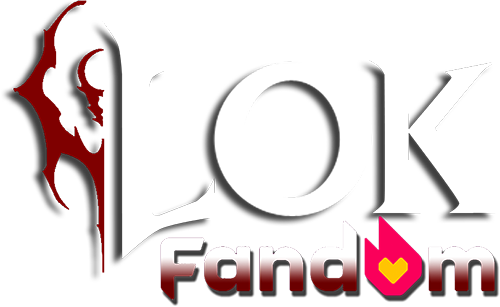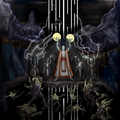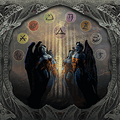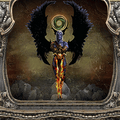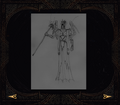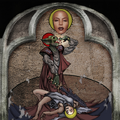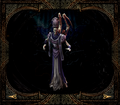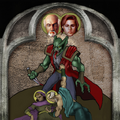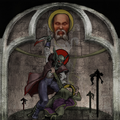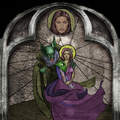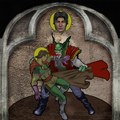Template:Faction
Template:Qlisten
The Circle of Nine was the collective name for an oligarchy of sorcerers summoned before Nosgoth's recorded history to serve and protect the Pillars of Nosgoth, which gave life to the land. All members of the Circle were Pillar Guardians, whose powers of longevity enabled them to live for centuries. Before the collapse of the Pillars and the post-Blood Omen era, there were almost always nine active members at a time. Circle membership and Pillar Guardianship were mutually inclusive, and inherent – if a Guardian died, the Circle remained broken for a certain time. New Guardians were chosen from those being born during or just after the death of the old guardian.
When Mortanius murdered Ariel under the control of the Hylden Lord in the pre-Blood Omen era, the subsequent corruption of the Pillars drove the incumbent Circle of Nine to irrevocable insanity. Kain, the corrupt Balance Guardian, purged his fellow Circle members and restored their Pillars, but instead of sacrificing his own life to complete the process and enable new Guardians to be born, he chose to live on – and thus triggered the Pillars' destruction. Since that event, he endured as the only serving Pillar Guardian in Nosgoth, and the Circle remained unable to renew itself.
The Circle was founded by, and once solely comprised of, ancient vampires. However, after the vampires became afflicted with the blood curse in the vampire-Hylden war, they were left sterile, and as the Pillars could only cull newborn successors, they began selecting human Guardians. The faction was also referred to as the Nine of the Protectors of Hope, or the Guardian Circle. Technically, as Kain (a Circle member) has appeared in all Legacy of Kain media, so too has the Circle of Nine. Circle members other than Kain appear in Blood Omen: Legacy of Kain, Legacy of Kain: Soul Reaver, Soul Reaver 2 and Legacy of Kain: Defiance.
Role
Template:Icon-BO1 Mankind Governs, the Binding Decays
Template:Qlisten
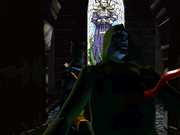
The slaughter of the Circle, in which six Guardians were killed by Vorador.
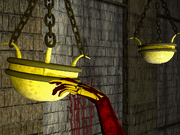
Ariel's murder at the hands of the Dark Entity.
Formed before Nosgoth's recorded history, after the Genesis of the Pillars and Summoning of the Guardians, the Circle comprised nine sorcerer-guardians, sworn to protect and serve the ancient edifices they represented.[1] In Nosgoth's early history, impelled by a marked increase in Nosgoth's vampire population, the human Guardians brought the Sarafan brotherhood into existence – instated to combat what they perceived as the looming vampire menace. Sponsoring the vampire purge – the Sarafan holy war – they orchestrated the deaths of thousands of their enemies.[2] The elder vampire, Vorador, retaliated; he infiltrated the Sarafan Stronghold where the Circle gathered, and slaughtered six of the Guardians.
The Circle's magic failed, and their appointed protector – the Conflict Guardian, Malek – arrived too late to defend them. He fought Vorador, and was easily defeated, but humiliatingly spared.Template:Ref-BO1-Misc[3] The Death Guardian Mortanius, one of only three Circle members to survive the attack, ensured that this failure did not go unpunished. He deprived Malek of the "pleasures of the flesh", magically stripping his spirit from his body, and fusing it to his armor. Mortanius decreed that Malek would serve as the Circle's Ward for eternity.[3] Now a wraith, Malek took up residence in a mountaintop fortress – Malek's Bastion – and plotted revenge on Vorador as the centuries passed.[4]
In the pre-Blood Omen era, Mortanius, like the Dimension Guardian, Azimuth, was seduced away from his service by a power beneath Avernus.[1][5] A malevolent being, associated with the name "Hash'ak'gik", possessed Mortanius's body, and utilized him to begin toppling the Circle. Under the control of this Dark Entity, Mortanius murdered Ariel, the Balance Guardian; Kain was born as her successor.[5][6] When Ariel's lover, Nupraptor, the Mind Guardian, discovered her corpse moments later, he became "wracked with grief and tormented by suspicions of treachery". He vowed vengeance on Mortanius and the fates themselves, directing a telepathic assault at the entire Circle.[4]
Template:Icon-BO1 Protectors and Destroyers of Hope
- "There is no cure for death. Only release. You must destroy the sorcery that is now poisoning Nosgoth.
Only then will you realize peace.
The Nine of the Protectors of Hope were sworn to use their powers to preserve our world. Now these pillars have been corrupted by a traitor." - ―Ariel[src]
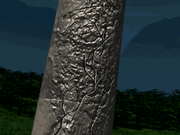
The corruption of the Pillars, triggered by Nupraptor.
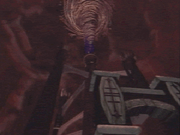
Dark Eden, one of the fruits of the Guardians' insanity.
The Mentalist's psychic onslaught rippled across Nosgoth, blasting "the minds of the sensitive and intellectual". All nine Circle members, including the infant, Kain, were tainted by irremediable insanity: "some raving like madmen, others maliciously in control of their actions".[4] The Pillars themselves physically corroded and turned gray, reflecting their patrons' mental states. The deranged Guardians, now "Destroyers of Hope", would all need to die for Nosgoth to be preserved. Only with the infection eliminated, and their Pillar tokens returned, could purer successors take their place.[2][4]
For thirty years, the insane Circle of Nine poisoned the land with their misapplied powers.[1][2] Nupraptor "rained upon Nosgoth all his pain and misery" from his Retreat, west of Vasserbünde; he sewed "his eyes and lips shut to deny the outside world", terrorizing his servants, the pilgrims who visited him, and the townsfolk alike.[7] Azimuth was reduced to a "raving lunatic that [revelled] in the pain and misfortune of others"; she summoned forth creatures from the Demon Realm to massacre numerous cities.[4] Anarcrothe, Bane and DeJoule – the States, Nature, and Energy Guardians – formed a triad, and malformed part of northern Nosgoth into the Dark Eden, a "garden of horrors, seeded with sick perversion of nature's design".
Moebius, the Time Guardian – who originally held a reputation for dispensing "benevolent and kind advice to anyone who sought it" as the Oracle of Nosgoth – now "[caused] trouble and torment by predicting omens and horrific events, exploiting them to his own ends".[4] Still lucid, however, was Mortanius. Seeking to redeem himself for compromising the Circle's integrity, Mortanius took action to "correct the imbalance" while still in control of his body.[6] He secretly compelled a band of assassins to murder Kain, now an adult nobleman unaware of his birthright, as Kain passed through the village of Ziegsturhl. Resurrecting Kain as a vampire, Mortanius guilefully set his powerful "undead son" against the corrupted Circle.
Template:Icon-BO1Template:Icon-SR1ComicTemplate:Icon-SR1 Now, Nosgoth is at Their Mercy
Template:Qlisten
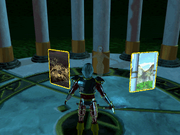
Kain realizes his role – Ariel's successor as Balance Guardian.
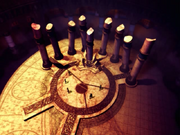
Kain triggered the Pillars' collapse, thus precluding the Circle's renewal.
Under the pretense that he would receive "a cure" to his vampirism, Kain followed advice from Mortanius, and the specter of Ariel, who now haunted the Pillars. He murdered the Guardians in succession as he traversed Nosgoth.[8] Beginning by slaying Nupraptor, he later dispatched Bane and DeJoule, while his ally, Vorador, settled his score with Malek by eliminating the wraith. Azimuth and Moebius, too, fell before him in battle. One by one, he killed the Guardians, returning their tokens to the Pillars.
Near the end of his quest, Kain traveled to the Pillars again, where he watched on as Anacrothe confronted Mortanius. Mortanius admitted to the murder of Kain, but argued that the current Circle had failed in its duties, and warranted destruction. Anacrothe disagreed, asserting the Circle's supreme authority: "the Circle exists for us, we don't exist for it [...] our powers will save or damn Nosgoth at our whim". They fought, and Mortanius easily slew his peer. Kain then battled the Necromancer, who succumbed to the Dark Entity's possession. Once Kain defeated the Entity, he realized that he himself was now "the only survivor of the Circle of Nine".
Ariel presented Kain his fateful dilemma – die to restore the Pillar of Balance, and renew the Circle, or refuse, and trigger the Pillars' collapse.[2] Kain decided not to sacrifice himself to heal Nosgoth. He elected to live on, and established an empire upon the Pillars' ruins.[8][9] No new successors could be born to take the place of the eight slain Guardians, and the Circle remained broken in perpetuity. Kain's choice, however, ultimately proved justifiable as he learned more of the truth behind the Circle's history: he would seek to return the Pillars to their original, vampire inheritors.
Template:Icon-SR1Template:Icon-SR2 Degenerating and Descending
Template:Qlisten
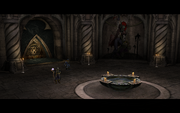
The Circle's gathering-room, where Vorador's attack took place.
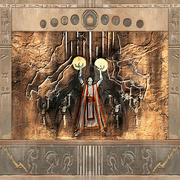
A Light Forge mural conclusively identifying the Pillars' architects.
Aside from the presence represented by Kain, the Circle retained little significance in the Soul Reaver era, but its history did not entirely fade. Raziel, Kain's second-in-command, had some awareness of its tale. Informed by Kain's "boasted exploits" of the Blood Omen era, he identified an image of Moebius, recognizing his status as a Circle member. After his execution by Kain, and resurrection by the Elder God, Raziel wished to destroy his former master and the vampires. He pursued Kain through the Chronoplast, and emerged in the pre-Blood Omen era, shortly before Ariel's murder.
Moebius welcomed Raziel to the Sarafan Stronghold. Raziel perused the Circle's gathering-room, where Vorador's attack transpired centuries ago. It featured commemorative murals of the six dead Guardians, all martyred to promote Moebius's mercenary army. At the Pillars, Kain urged Raziel to "be still", as he narrated the edifices' corruption in real time. He implied that he refused the sacrifice primarily to ensure the survival of the vampire race. When he agreed with Raziel that the Pillars should be restored, Raziel reiterated Kain's obligation to die and allow new Guardians to be culled.
Kain simply retorted that the Pillars belonged to the vampires rather than the humans, and hinted that there may be another, third option to resolve the predicament. Exploring his own destiny, Raziel traversed pre-Blood Omen era Nosgoth, and used the Wraith Blade to enter the Subterranean Pillars Chamber, the Dark Forge, and the Light Forge. The long-lost murals within all concurred with Kain's enigmatic claim. A forgotten race of "winged creatures" – the ancient vampires – "were indeed the architects of the Pillars".
Template:Icon-SR2Template:Icon-DefianceComicTemplate:Icon-Defiance The Crux of Our Dilemma
Template:Qlisten
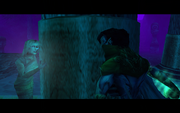
Raziel disputes Ariel's views on the downfall of the Circle.
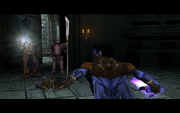
Malek's folly during the Circle's slaughter.
When he traveled to the post-Blood Omen era, Raziel briefly debated the benevolence of the Circle with Moebius and Ariel. He scorned Ariel for setting Kain on her fellow Guardians, and for keeping "him ignorant of his destiny while [she] used him as the scourge of the Circle". He continued into Nosgoth's early history, where he found the last of the ancient vampires, Janos Audron. Janos revealed that, thousands of years before, nine Guardians had been called to serve the Pillars at the time of the Binding. He was the tenth, honorary Guardian – the keeper of the Reaver, the "key" to the Binding.
The ancient vampire explained that his race was "no longer born", and thus could not be chosen as Guardians. Once the vampires began to die out, the humans "claimed the Pillars for themselves – wholly ignorant of their true purpose". Janos's subsequent murder at the hands of the Sarafan motivated Raziel to pursue the killers to the Sarafan Stronghold. His arrival coincided with that of Vorador's simultaneous attack, also for Janos's murder – the slaughter of the Circle had begun. Moebius, it transpired, betrayed Malek and the martyrs all along; Malek was preoccupied, defending Moebius from Raziel, and thus unable to come to the other Guardians' rescue.
Kain and Raziel later explored the original, vampire Circle's history in more depth. The first Guardians ruled from the Council Chamber of the Vampire Citadel, hidden in the Lake of Tears. The Pillars were raised to imprison the vampires' ancient enemies, the Hylden, in the Demon Realm, but the Hylden countered by afflicting the vampires with the blood curse. Sterile, divorced from the Wheel of Fate, and abandoned by their deity – the Elder God – the vampires turned to suicide. The Circle's "guardianship [did] not sustain them". The original Guardians were entombed within the Citadel, while the Hylden attempted to sabotage the Pillars from their prison. The Dark Entity, Mortanius's possessor, was a leader among the Hylden race.[5]
Template:Icon-Defiance In the Possession of the Vampires
- "As long as a single one of us stands, there is still hope. The Pillars must not remain under human guardianship. They are not competent to serve."
- ―Janos Audron[src]
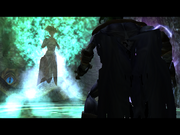
The Spirit Forge summons the souls of the deceased Balance Guardians.
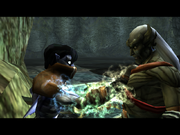
Raziel purifies Kain, returning legitimate control of the Circle to the vampires.
Kain unearthed a mural in the Vampire Citadel which bridged the gap between the vampire Circle's and human Circles' histories. "As the Vampires began to die out, the Pillars summoned human Guardians to fulfill their roles. It seemed the ancient Vampires had adopted – and, when necessary, abducted – the human Guardians, and made vampires of them when they came of age. Until the humans rebelled against their masters [...] it was Moebius the Time Streamer, and Mortanius, Guardian of Death, who led the bloody revolt". Kain, the Scion of Balance, was "the first vampire Guardian in all these centuries".
In the Blood Omen era, Raziel traveled to the Citadel multiple times, absorbing the souls of the original Guardians' specters to enhance the Wraith Blade. He encountered Mortanius, and resurrected Janos, both of whom stressed the importance of returning control of the Circle to the vampires, for the benefit of the Binding, and Nosgoth. Raziel found the Spirit Forge, which summoned the spirits of Ariel, and all previous Balance Guardians, to baptize the Wraith Blade: it was now the Spirit Reaver. "Far from being enlightened", though, Raziel found himself "entangled in an even greater web of mysteries".
Eventually, Raziel came to understand his opportunity. Ariel had been "the last pure, undefiled member of the Guardian Circle", and Kain might be receptive to that purity. Before his demise, Raziel dispersed the energies of the Wraith Blade into Kain, and healed him. Its essence cured him of Nupraptor's corruption which he harbored since birth, consummating his "third option". Raziel's final action ensured that Kain could now truly fulfill his role as Balance Guardian, and as a member of the Circle. "The pillars [were] once more in the possession of the Vampires".[10]
- "Curse or blessing, it is the price we pay to keep the Hylden banished from the land. To sustain the Binding, we had to preserve our bloodline. And so we passed the dark gift to the human successors of our fallen Guardians. They rebelled, inevitably, refusing the curse and seizing the Pillars as their own.
And so we come to our present dilemma. While mankind governs the Pillars, the Binding decays. The Hylden strain against the barriers of their prison, scratching to gain a foothold back into this world." - ―Janos Audron[src]
Membership and hierarchy
Pillar Guardianship
Template:Qlisten

A diagram connecting Nosgoth's magical principles.
From its inception, the Circle of Nine was typically represented by nine Pillar Guardians, each "aligned to the principle of the Pillar he serves".[8][11] These fundaments were the Mind, Dimension, Conflict, Nature, Balance, Energy, Time, States, and Death. Mythologically, the Pillar principles were each, in turn, aligned with elemental principles. Conflict and Nature were attuned to Fire (linked to Light), Death and States were aligned with Water (Darkness), Energy and Time were associated with Earth (Darkness), and the Mind and Dimension were matched with Air (Light).[10] Balance, "at the center, binding them all together" – "the axis of them all" – was attuned to Spirit.[11]
All Pillar Guardians were bestowed with limited immortality in the form of extreme longevity of life, and were hence not susceptible to death from old age; however, they could be killed in combat, or through other circumstances.[11][12] Guardians served the Pillars for their entire lifetime. When a Guardian died, the supernatural force behind the Pillars ensured that a replacement, somewhere in Nosgoth, was soon automatically culled to assume their vacant position; Kain, for example, was born only moments after Ariel's death. Senior Guardians were obliged to "seek out and apprentice" their deceased peers' new successors into the Circle.[11]
Members were not usually aware that they were Guardians, belonging to the Circle, before being "discovered or adopted".[13] Kain remained unaware that he was the Balance Guardian, and the most junior member of the Circle, until he was thirty years old, after the death of Mortanius.[8]
Circle members were granted a unique Pillar token, or binding item, which contained a measure of their Pillar's magic. The item was tailored to each specific Guardian as their link to the Pillars, and was returned to their Pillar in the event of their death. In the exclusive case of the Balance Guardians, the binding item was not a traditional, physical token – those individuals' very souls bound them to the Pillar of Balance.[13]
The nine Guardians were all symbiotically bound. They each displayed tremendous and extraordinary magical powers, and held duties and responsibilities in accordance with their Pillar principle.[11]Template:Ref-Defiance-Prima
- Template:Icon-Pillars-Mind The Mind Guardian: Mind Guardians possessed unparalleled affinity for telepathy and telekinesis.[4] They were charged with reigning over the limitless power of thought, consciousness, and emotion.[14]
- Template:Icon-Pillars-Dimension The Dimension Guardian: Dimension Guardians could perceive, and shift between, the Material, Spectral, and Demon Realms.[4][15] They were charged with controlling and defining the very boundaries, consistency, and form of space itself.[14]
- Template:Icon-Pillars-Conflict The Conflict Guardian: Conflict Guardians could incite or resolve wars or arguments, drawing their powers from battle.[4][15] They were charged with presiding over the precepts of change and upheaval.[14]
- Template:Icon-Pillars-Nature The Nature Guardian: Nature Guardians could commune with, influence, and summon natural phenomena.[4][15] They were charged with governing over plants, animals, and all forms of natural life.[14]
- Template:Icon-Pillars-Balance The Balance Guardian: Balance Guardians could draw upon other Guardians' abilities in order to kill off those who went astray.[16] They influenced the regulation of other magic in Nosgoth, and were charged with pruning the corrupted forces of the Circle.[4][17]
- Template:Icon-Pillars-Energy The Energy Guardian: Energy Guardians could instill power in objects and devices.[4][15] They were charged with ruling over the wild arching power that spawned the storm and sparked life itself.[14]
- Template:Icon-Pillars-Time The Time Guardian: Time Guardians held a certain level of omniscience due to an intimate understanding of the time-stream.[4] They were charged with keeping the flowing currents and movements of the temporal world in check.[14]
- Template:Icon-Pillars-States The States Guardian: States Guardians could defy physics, warping and transitioning between physical forms.[4][15] They were charged with presiding over the shapes and forms of all physical matter.[14]
- Template:Icon-Pillars-Death The Death Guardian: Death Guardians held a measure of mastery over the afterlife.[4] They were charged with helping to ensure equivalency between life and rebirth.[14]
Activities of the Circle of Nine
Template:Qlisten
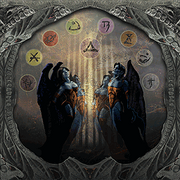
A mural depicting the summoning of the original Circle.

A mural chronicling the human Guardians' revolt for control of the Circle.
The Circle evinced no clearly-defined hierarchy, and no Pillar principle was intrinsically more valuable than another. Only the Balance Guardian exercised judicial authority over others: "he/she [was] the hub, the still point around which all the other Pillars principles turn".[13]
Even so, factionism existed, and the dynamic between certain members suggested that seniority and juniority was acknowledged by some, probably correlated with duration of service. For example, Malek viewed himself as a subordinate to Moebius, not a colleague, and the martyred Mind Guardian and Dimension Guardian operated as master and apprentice, respectively.[18] Of his peers, Mortanius was considered the most powerful Guardian, and "the most potent wizard in all of Nosgoth".[4]
In their solitary dealings and as an allied group alike, the Circle involved itself with many of Nosgoth's most prominent factions. In Nosgoth's early history, it organized the creation of the Sarafan, and sponsored the vampire purge. The Sarafan were "devoutly loyal to the Circle", answering to Malek, the Conflict Guardian.[1] Following the slaughter of the Circle and the deaths of the warrior inquisitors, they instead served Moebius, who was also connected to the later creation of the legions of the Nemesis. Azimuth reigned over the "religious autocracy" of Avernus during the pre-Blood Omen era, and led the Hash'ak'gik cult with Mortanius.[5] After the corruption of the Pillars, Anacrothe, Bane, and DeJoule's alliance resulted in Dark Eden and its mutants. Kain's empire, too, was a product of the Circle's influence.[8]
Schisms erupted and values fluctuated as the Circle's history progressed. The original, ancient vampire-dominated Circle unilaterally worshipped the Elder God and the Wheel of Fate, and championed the banishment of the Hylden, whom they referred to as the Unspoken. A vestige of this tradition endured even when the humans claimed the Pillars: Ariel respected the decree from her "ancestors" that the Hylden never be mentioned by name. However, by the Blood Omen era, the Guardians' views had become much more disparate, and they had developed a reputation for elitist reclusiveness: "rarely did a sorcerer condescend to work with others".
Known Guardians and succession
Template:Qlisten
As noted at Dark Chronicle, "from the games it is impossible to know exactly how many Guardians each Pillar had between their creation and collapse". There are gaps in known history which allow for an indefinite number of intermediate Guardians to have existed. Despite this, an outline of all currently-known information on the succession in the Guardian roles can be produced.[19]
Each Pillar has been served by at least two Guardians, and four full incarnations of the Circle of Nine can be chronicled, including the nine original Guardians, and all nine of their corrupt, final successors.
| Pillar | Guardian | Principle | Original Guardian | Nosgoth's early history | Pre-Blood Omen era | Blood Omen era |
|---|---|---|---|---|---|---|
| of the Mind | of the Mind | Mind, original → (up to several millennia) |
→ Mind, martyred → (duration unknown) |
→ Nupraptor (up to 500 years) |
Nupraptor † | |
| of Dimension | of Dimension | Dimension, original → (up to several millennia) |
→ Dimension, martyred → (duration unknown) |
→ Azimuth (up to 500 years) |
Azimuth † | |
| of Conflict | of Conflict | Conflict, original → (up to several millennia) |
→ Malek (at least ~530 years) |
Malek | Malek † | |
| of Nature | of Nature | Nature, original → (up to several millennia) |
→ Nature, martyred → (duration unknown) |
→ Bane (up to 500 years) |
Bane † | |
| of Balance | of Balance | Balance, original → (up to several millennia) |
→ Balance, martyred → (duration unknown) |
→ Ariel → (up to 470 years) |
Kain (incumbent) | |
| of Energy | of Energy | Energy, original → (up to several millennia) |
→ Energy, martyred → (duration unknown) |
→ DeJoule (up to 500 years) |
DeJoule † | |
| of Time | of Time | Time, original → (up to several millennia) |
→ Moebius (at least ~2500 years) |
Moebius | Moebius † | |
| of States | of States | States, original → (up to several millennia) |
→ States, martyred → (duration unknown) |
→ Anarcrothe (up to 500 years) |
Anacrothe † | |
| of Death | of Death | Death, original → (up to several millennia) |
→ Mortanius (at least ~2500 years) |
Mortanius | Mortanius † |
- The summoning of the Guardians – before Nosgoth's recorded history:
The original, ancient vampire Guardians represented Balance, Conflict, Death, Dimension, Energy, the Mind, Nature, States, and Time. All nine began service when the Pillars were summoned.
It is unclear exactly when these earliest Guardians died. Thousands of years passed between the vampire-Hylden war and the beginning of Nosgoth's early history – each original Guardian could have served for millennia before dying and being interred in the Vampire Citadel. Thus, there is a gap here allowing for unseen Guardians to have served all nine Pillars until the following event.[19]
- The human revolt – before Nosgoth's recorded history:
The next known successors are Moebius (Time) and Mortanius (Death). Both were born before Nosgoth's recorded history, prior to the revolt, and continued to serve the Pillars until their eventual collapse.
Unseen, intermediate Guardians may have served the other seven Pillars until the following event.[19]
- The slaughter of the Circle – Nosgoth's early history:
By this point, alongside Moebius and Mortanius, the Pillars were served by human Guardians representing Balance, Conflict (Malek), Dimension, Energy, the Mind, Nature, and States. After Vorador's attack, Malek, Moebius, and Mortanius were the Circle's only survivors.
Though Mortanius effectively killed Malek by transforming him into a wraith, his service of the Pillar of Conflict persisted even in this form; he was not succeeded by a new Guardian. The other six Pillars with vacancies may have been served by unseen Guardians until the following event.[19]
- The corruption of the Pillars – the pre-Blood Omen era:
Six unnamed Guardians were killed by Vorador in his slaughter of the Circle during Nosgoth's early history, and later martyred by Moebius: Balance, Dimension, Energy, the Mind, Nature, and States. In this era, the Circle consisted entirely of humans. Malek, Mortanius, and Moebius survived this event, and would continue to serve the Pillars for another five centuries, until their eventual collapse.
- The Blood Omen era:
Ariel was murdered in the pre-Blood Omen era, and directly succeeded by Kain.
The corruption of the Pillars entailed that no new Guardians could be born until the current Circle was destroyed. Thirty years later, Kain was killed at Ziegsturhl, but was revived as a vampire by Mortanius: his guardianship also persisted, despite his death. Kain killed all of his peers, with the exception of Malek (destroyed by Vorador), and Anacrothe (slain by Mortanius). As the only survivor, however, Kain refused to sacrifice himself and fully purify the Pillars. He lived on, but the Pillars collapsed, and no new Guardians were culled to serve the Circle.
Background
Template:Banner-RealWorld
Blood Omen: Legacy of Kain director Denis Dyack, of Silicon Knights, originally conceived the concept of the Pillars of Nosgoth, from which the Circle of Nine was derived. In doing so, he drew inspiration from the cover art of Ken Follett's 1989 historical novel, The Pillars of the Earth.
Notes
- The longest-serving Circle members whose minimum age at death can be estimated were Moebius and Mortanius, who served their Pillars for at least 2500 years. This figure is based on a comment from Janos Audron that he had been guarding the Reaver "alone" for thousands of years (therefore, at least 2000 years) while his race died out; Moebius and Mortanius were born at a time when the ancient vampires still controlled the Circle. Kain's estimated duration of service as of the Purification of Kain is relatively comparable, though still shorter.
- There are implications that Kain's purification in the Blood Omen era may have prospectively restored the Soul Reaver-era Pillar of Balance, already allowing new Guardians to be born – "and as each guardian is born, so the corresponding pillar would be rebooted". However, this has not been witnessed.[10][20][21][22]
- Information on the Circle's existence and nature was openly available to Nosgoth's commonfolk in the Blood Omen era: a book in the Library of Willendorf discusses its origins, and briefly explains its workings. However, the populace were not necessarily aware which individuals comprised the Circle; for example, Kain did not recognize who Moebius was until late into his quest to destroy the Circle. Many various sects of sorcerers existed in Nosgoth, presumably making it difficult to determine exactly who the Pillar Guardians were at any given time.
- In Blood Omen: Legacy of Kain, Moebius - under the guise of the Oracle of Nosgoth - tells Kain that Malek has "allowed no members of the Circle to fall" since Vorador's attack, five centuries before. This claim would imply that Ariel, Anacrothe, Azimuth, Bane, DeJoule and Nupraptor were the direct successors of the martyred Guardians killed by Vorador, and had each served for almost five hundred years. However, Moebius's comment was at least partially flawed, and should probably not be taken at face value: it failed to account for the death of Ariel, which had taken place thirty years earlier, and the deaths of Nupraptor and Kain himself, which had occurred recently.
- In the fourth timeline, Moebius was resurrected by the Elder God, shortly after his death at Kain's hands. It is debatable whether or not Moebius could still be considered the Time Guardian and a member of the Circle at that point. His Pillar token - his Hourglass - had already been returned to the Pillar of Time. Since the Hourglass was described as the "focus of his time-streaming magic", its loss - and the potential loss of Moebius's symbiotic connection to the Pillars - may help to explain the "crack" in his omniscience at the end of Legacy of Kain: Defiance.
Gallery
The Circle
Individual Guardians
Appearances
- Template:Icon-BO1 Blood Omen: Legacy of Kain
- Template:Icon-SR1Comic Legacy of Kain: Soul Reaver comic
- Template:Icon-SR1 Legacy of Kain: Soul Reaver
- Template:Icon-SR2 Soul Reaver 2
- Template:Icon-BO2 Blood Omen 2
- Template:Icon-DefianceComic Legacy of Kain: Defiance comic
- Template:Icon-Defiance Legacy of Kain: Defiance
Non-canonical
- Template:Icon-TRL Tomb Raider: Legend (depicted only)
- Template:Icon-TRA Tomb Raider: Anniversary (depicted only)
- Template:Icon-TRU Tomb Raider: Underworld (depicted only)
- Template:Icon-LCGOL Lara Croft and the Guardian of Light (Raziel and Kain Character Pack)
See also
- Ancient vampires
- Binding
- Circle's gathering-room
- Collapse of the Pillars
- Corruption of the Pillars
- Council Chamber
- Dark Eden triad
- Humans
- Pillar Guardians
- Pillar tokens
- Pillars of Nosgoth
- Genesis of the Pillars
- Sacrifice
- Sarafan Stronghold
- Summoning of the Guardians
- Vampire Citadel
- Template:Icon-DC Legacy of Kain: All Pillar Guardians at Dark Chronicle (by Marie Tryhorn).
- Template:Icon-DC SK: The Complete Guide To Legacy of Kain - The Players at The Complete Guide To Legacy of Kain (archived at Dark Chronicle).
References
- ↑ 1.0 1.1 1.2 1.3 Template:Icon-DC Soul Reaver 2: Historical Timeline at Dark Chronicle (by Marie Tryhorn)
- ↑ 2.0 2.1 2.2 2.3 Template:Icon-NR GLoK Interviews with Amy Hennig at Nosgothic Realm (by Raziel Fan), post #5 (by RazielFan)
- ↑ 3.0 3.1 Template:Icon-Eidos Chris@Crystal's Greatest Hits at the Eidos Forums (by Divine Shadow)
- ↑ 4.00 4.01 4.02 4.03 4.04 4.05 4.06 4.07 4.08 4.09 4.10 4.11 4.12 4.13 4.14 4.15 Template:Icon-DC The Players at SK: The Complete Guide To Legacy of Kain (archived at Dark Chronicle)
- ↑ 5.0 5.1 5.2 5.3 Template:Icon-TLW Question and Answer with Amy Hennig at The Lost Worlds (by Ben Lincoln)
- ↑ 6.0 6.1 Template:Icon-DC Miscellaneous Questions & Answers at SK: The Complete Guide To Legacy of Kain (archived at Dark Chronicle)
- ↑ Cite error: Invalid
<ref>tag; no text was provided for refs namedBO1-Misc - ↑ 8.0 8.1 8.2 8.3 8.4 Template:Icon-DC Soul Reaver 2: Background Story at Dark Chronicle (by Marie Tryhorn)
- ↑ Template:Icon-DC Soul Reaver: Background Story at Dark Chronicle (by Marie Tryhorn)
- ↑ 10.0 10.1 10.2 Template:Icon-Eidos Answers to questions from the Defiance team at the Eidos Forums (by Chris@Crystal)
- ↑ 11.0 11.1 11.2 11.3 11.4 The Pillars at the Soul Reaver 2 official site
- ↑ Template:Icon-Eidos Questions reguarding BO1. at the Eidos Forums (by TheElderGodofNosgoth), post #16 (by Anubis_Orr)
- ↑ 13.0 13.1 13.2 Template:Icon-Eidos Warp's answers from Amy at the Eidos Forums (by blincoln)
- ↑ 14.0 14.1 14.2 14.3 14.4 14.5 14.6 14.7 Cite error: Invalid
<ref>tag; no text was provided for refs namedDefiance-Prima - ↑ 15.0 15.1 15.2 15.3 15.4 Template:Icon-DCab So many questions at DCabDesign (by Luke27), post #11 (by Daniel Cabuco)
- ↑ Template:Icon-DCab So many questions at DCabDesign (by Luke27), post #10 (by Daniel Cabuco)
- ↑ Template:Icon-DCab So many questions at DCabDesign (by Luke27), post #4 (by Daniel Cabuco)
- ↑ Template:Icon-DCab Various art and plot questions at DCabDesign (by Dubiel), post #2 (by Daniel Cabuco)
- ↑ 19.0 19.1 19.2 19.3 Template:Icon-DC Legacy of Kain: All Pillar Guardians at Dark Chronicle (by Marie Tryhorn)
- ↑ Template:Icon-DCab Reaver's final purpose at DCabDesign (by Corpse), post #3 (by Daniel Cabuco)
- ↑ Template:Icon-DCab Changes in the Scion of Balance at DCabDesign (by Corpse), post #2 (by Daniel Cabuco)
- ↑ Template:Icon-DCab Kain's next move at DCabDesign (by Kain_Fan), post #13 (by Daniel Cabuco)
Template:Navbox-Pillars Template:Navbox-BO1-characters Template:Navbox-Nosgoth-History Template:Navbox-Nosgoth-Inhabitants
